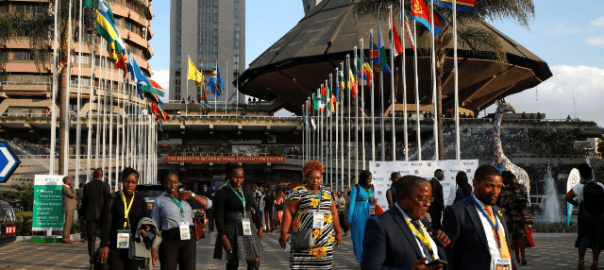By Alister Doyle | Climate Correspondent
The Africa Climate Summit (ACS) is hearing a lot about “opportunities” for combating climate change on the continent that has done least to cause warming yet is most vulnerable to its harmful impacts.
The September 4-6 summit in Nairobi is a striking shift for African governments, who have berated rich nations for failing to meet a promise to mobilise $100 billion a year in climate finance by 2020. That year, it totalled just $83 billion.
“For a very long time we have looked at this as a problem,” Kenyan President William Ruto said of Africa and climate change. “It is time we flipped and looked at it from the other side. There are opportunities, immense opportunities”.
“We are not here to catalogue grievances and list problems, we are here to scrutinise ideas, assess perspectives so that we can unlock solutions,” he told delegates.

Delegates walk outside the Kenyatta International Convention Centre (KICC) during the first day of Africa Climate Summit (ACS) 2023 in Nairobi, Kenya, September 4, 2023. REUTERS/Monicah Mwangi
|
For an example of opportunities, read the opinion piece by Malawi’s President Lazarus Chakwera about his drive for solar, hydro and other renewable energies. “Malawi may be a small country. However, that is not impeding us from going big where it matters: renewable energy,” he writes. And livestock – from sheep to cattle – provide opportunities for sustainable farming to slow climate change, argue Kenya’s Environment Minister Soipan Tuya and Appolinaire Djikeng, director general of International Livestock Research Institute.
A farm worker distributes a line of feed to Angora goats near drought-stricken Graaff-Reinet, South Africa, November 16, 2019. REUTERS/Mike Hutchings |
|
“For the millions of herders, pastoralists and small-scale farmers like our families, the ability to keep livestock is central to ensuring that Africa’s response to the climate crisis is also just and equitable,” they write. And Mohamed Adow, director of energy and climate think-tank Power Shift Africa, writes that “the youngest continent on Earth is finally coming of age. This will bring exciting opportunities and, equally, great expectations”. Highlighting opportunities for investment, despite past unkept promises of climate finance, the summit spurred pledges of hundreds of millions of dollars to boost Africa’s carbon credit production by 2030, with the United Arab Emirates alone committing $450 million. Early September will also get a technical report by the United Nations about action under the 2015 Paris Agreement, which seeks deep cuts in global emissions to limit warming. In a spoiler alert, U.N. climate change chief Simon Stiell told the Africa summit: “We are not on track”. Echoing the summit buzzword, he said the COP28 meeting in Dubai starting in November will be “a key opportunity to course correct towards a sustainable future”.
The trail to Tiger’s Nest monastery in Paro in Bhutan, June 22, 2023. Thomson Reuters Foundation/Roli Srivastava |
Himalayan successThe global “stocktake” of climate action at COP28 will give clues about which nations are doing the most to slow climate change, and which are laggards. The Himalayan kingdom of Bhutan is a member of a tiny, stellar club – also including Suriname and Panama – which are carbon negative. That means Bhutan’s forests absorb more emissions than it produces each year. Read our correspondent Roli Srivastava’s story about Bhutan’s efforts to attract tourists – to promote jobs and the economy – while safeguarding nature from too many visitors. Last month, Bhutan halved a wallet-emptying $200 daily fee charged for visitors. “Our future requires us to protect our heritage and forge fresh pathways for forthcoming generations,” said Dorji Dhradhul, the director general of Bhutan’s tourism department.
Houses in Queens in an area prone to flooding are reflected in a puddle during a Nor’easter in New York, U.S., October 26, 2021. REUTERS/Caitlin Ochs |




